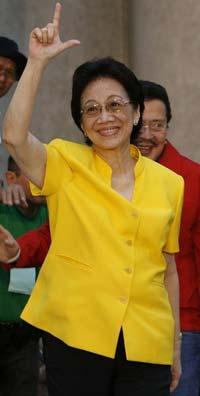The tragedy of Asia’s leading ladies

The recent death of Filipino democracy icon Corazon “Cory” Aquino brings to focus a unique sisterhood of tragedy that has given rise to some of Asia’s greatest leaders.
In a region where women play second-fiddle to men, the ascendance of Asia’s leading ladies is often tied to them being the daughters, wives or widows of those overthrown, detained or killed.
Cory Aquino, 76, was one of them.
The housewife was thrust into politics by the assassination of her husband, opposition senator Benigno ‘Ninoy’ Aquino, on August 21, 1983. The murder sparked unprecedented protests against then-dictator Ferdinand Marcos.
In February 1986, Aquino led millions of Filipinos in a four-day ‘people power’ revolt that forced the aged strongman and his family to flee into exile to Hawaii after an iron-fisted two-decade rule.
She brought democracy back to the Philippines, served as president until 1992 and was known as the nation’s Joan of Arc not only in her country but also around the world.
At her funeral last weekend was Wan Azizah Ismail, the wife of Malaysian opposition leader and former deputy prime minister Anwar Ibrahim.
While her husband was jailed for so-called corruption and sodomy charges, Wan Azizah led the reform movement in Malaysia and loosened the grip of the ruling coalition.
“The Malaysian people have a special reason to view her as an iconic figure,” said Wan Azizah at the funeral, while her husband was leading protests in Malaysia against a draconian colonial-era security law that allows for unlimited detention without trial.
Mourning Aquino’s passing but not being able to attend was Aung San Suu Kyi, the detained opposition leader in Burma.
Aquino had always called Suu Kyi “the rightful leader of Burma.”
Suu Kyi is the only child of Burma’s independence hero Bogyoke Aung San, who was assassinated in 1947. Suu Kyi led her opposition party to a landslide victory in elections in 1990, but the military regime has refused to relinquish power. Instead, they have kept the winner of the 1991 Nobel Peace Prize under house arrest.
South Asia is no stranger to female rulers fathered by bloodshed.
Sri Lanka which has just emerged from a 25-year-old civil strife was led by Sirimavo Bandaranaike after a Buddhist monk assassinated her premier husband. She ruled the island nation’s politics for nearly three decades.
Benazir Bhutto became the Prime Minister of Pakistan, nine years after her father was executed by a military regime.
After restoring democracy to the military-run Muslim nation in 1988, she was twice ousted by presidential decree before being assassinated herself.
India’s most recognizable political figure today is Sonia Gandhi, the Italian-born wife of Rajiv Gandhi, who was assassinated in 1991.
In Bangladesh, two women have ruled the impoverished nation at various times over the last one-and-a-half decades.
Current Prime Minister Sheikh Hasina Wazed is the eldest of five children of Sheikh Mujibur Rahman, the founding father and first president of Bangladesh, who was assassinated by a group of army officers.
She succeeded Khaleda Zia, the widow of assassinated President of Bangladesh Ziaur Rahman.
Indonesia’s first female president and current opposition leader is Megawati Sukarnoputri the daughter of the archipelago’s founding leader, Sukarno, who was overthrown in a bloody military uprising.
Aquino in one of her speeches said: “Politics must not remain a bastion of male dominance, for there is much that women can bring into politics that would make our world a kinder, gentler place for humanity to thrive in.”
Tragically in Asia, this prophecy is too often written in blood.









